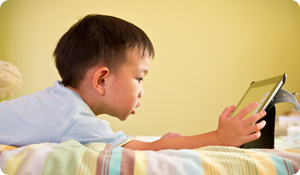
Since iPads arrived on the scene three years ago, legions of parents have come to lean on them—and not just so they can play games and read the news. The devices keep kids entranced. One reviewer of children's media even called the iPad—and other tablet computers—"baby rattles on steroids." As the tablets have grown in popularity, many more interactive apps for 2-and 3-year-olds are entering the market.
While plenty of toddler aps tout their educational value, you may be worried about the affect interactive technology is having on your tot's rapidly developing brain. Should parents limit their kids' exposure to all these tempting apps? The American Academy of Pediatrics recommends that kids under two not have any exposure to TV and other entertainment media, and that older kids be limited to no more than one to two hours per day. But the AAP has yet to weigh in on iPads and tablets like them.
Other experts say iPads and similar tablet computers can promote learning, but stress that there should be limits on the time kids spend with them. "They are wonderful tools," says Emily Levy, EdD, director of EBL Coaching and the author of Strategies for Study Success, a 15-part student workbook series. "But it is important to use them as active tools, not passive ones."
On the plus side, tablet computers provide toddlers with a multi-sensory experience that they don't get from books or old-fashioned board games. "iPads and tablets add another layer of stimulation," Levy says. But, she cautions, they can create a passive experience too so it's important for parents to be involved when their little ones play with them. "You should be actively engaging your child when he uses the iPad," she says. "It is much better than having him just sit there passively listening to it."
Apps for toddlers are fun and bright, and interactive. They also require good listening skills on the part of the child, notes Amelia Miller, chief of child development rehab at La Rabida Children's Hospital in Chicago.
One drawback, though, is that it's one-dimensional. Infants and toddlers learn by touching things, feeling, and putting things into their mouths," Miller says. "They experience how heavy or light something is. They let it drop and learn from getting it back." And, she adds, "Children learn best within the context of a relationship, so it is also important for a child's caregiver to play with him on the iPad."
If you buy your toddler apps and let her play on the iPad, follow these tips, Miller suggests.
- Limit the time your toddler spends playing with the iPad. Providing a variety of play experiences is important. Physical activity, fresh air, and sunshine is valuable on many levels.
- Know the content of the apps your child is using.
- Sit with your child as he plays, and experience the app with him. Talk to him about the experience after you've put the iPad away.
Amelia Miller reviewed this article.
Sources:
"Here & Now. Do toddler apps turn young brains to mush?" 90.9 WBUR.
http://hereandnow.wbur.org/2013/03/26/toddler-apps-ipads
American Academy of Pediatrics. "Media and children"
http://www.aap.org/en-us/advocacy-and-policy/aap-health-initiatives/Pages/Media-and-Children.aspx





